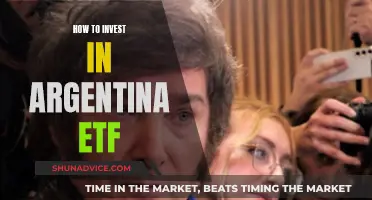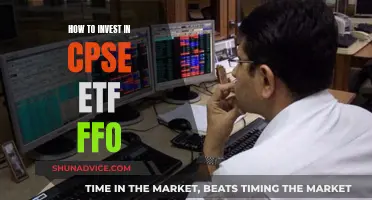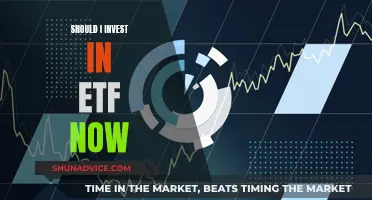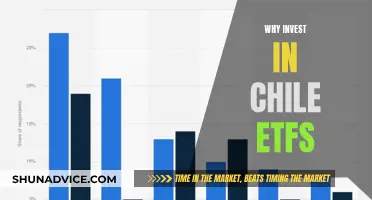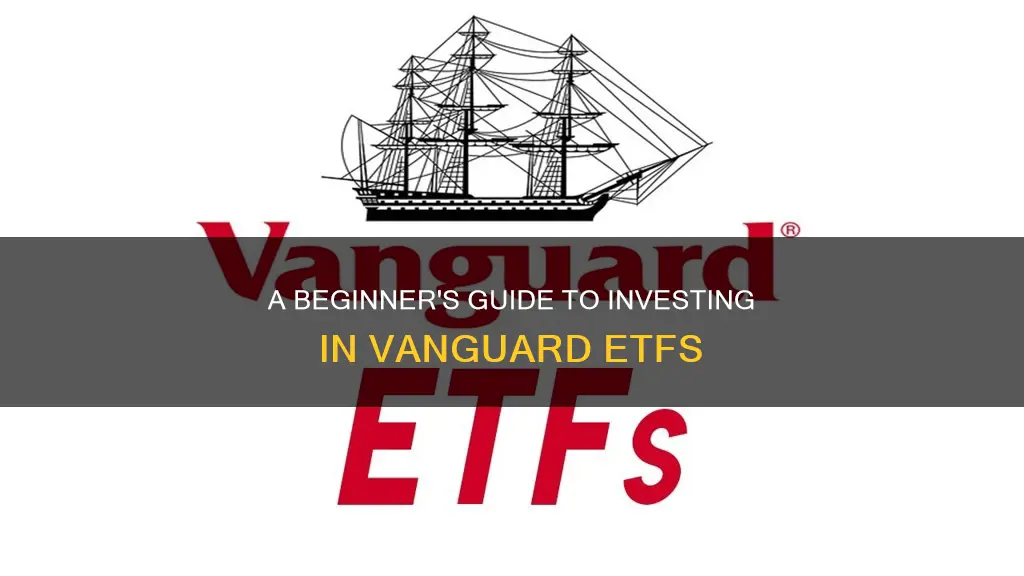
Investing in Vanguard ETFs can be a great way to get exposure to a diverse range of stocks and bonds. Vanguard offers a wide range of ETFs, including total market equity funds, niche sector ETFs, and international funds, providing something for every type of investor. To invest in Vanguard ETFs, you'll need to open a Vanguard Brokerage Account. This account will allow you to trade ETFs and stocks online, with the added benefit of commission-free trades when buying or selling ETFs. Once you have your account set up, you can choose from the various Vanguard ETFs available, such as the Vanguard S&P 500 ETF (VOO) or the Vanguard Total Stock Market ETF (VTI), and place your order through the Buy & Sell page on their website. It's important to remember that investing carries risks and you may lose the money you invest, so make sure to do your research and consider seeking financial advice if you're unsure.
| Characteristics | Values |
|---|---|
| Investment minimum | $1 |
| Investment types | General investing accounts, Joint & individual accounts, Roth & traditional IRAs, SEP-IRA, Trust accounts, Organization accounts |
| Management style | Self-managed or Vanguard-managed |
| Account opening time | 10 minutes |
| Account opening requirements | Social Security number, bank account number |
| Brokerage account | Required |
| Brokerage account charges | Commission-free trades when buying or selling Vanguard ETFs online |
| Settlement fund | Required for new brokerage accounts |
| Settlement fund requirements | No minimum investment |
What You'll Learn

Opening a Vanguard Brokerage Account
To open a Vanguard Brokerage Account, you will need to have some information to hand, such as your Social Security and bank account numbers. You can open your account online in about 10 minutes.
First, you will need to choose which type of account you want to invest in. You can choose from a general investing account, a Roth or traditional IRA, or a Uniform Gifts to Minors Act (UGMA) or Uniform Transfers to Minors Act (UTMA) account.
Then, you can decide on a management style. You can choose to manage your own funds or have Vanguard do it for you.
If you already have a Vanguard Brokerage Account, you can buy and sell Vanguard ETF Shares through Vanguard Brokerage Services. You can also trade through another broker, but they may charge commissions.
Vanguard offers commission-free trades when you buy or sell ETFs online. However, trades placed over the phone may be subject to a broker-assisted commission.
ETFs: Active or Passive Investing Approach?
You may want to see also

Understanding investment types
Before investing in Vanguard ETFs, it is important to understand the different types of investments available and how they can align with your financial goals. Here are some common investment types to consider:
- Exchange-Traded Funds (ETFs): ETFs are a type of investment fund that combines the diversification of mutual funds with real-time pricing. ETFs are traded on major stock exchanges and offer a collection of hundreds or thousands of stocks or bonds managed by experts. They provide diversification, low costs, and the ability to trade shares during trading hours. Vanguard offers a wide range of ETFs tailored to various investment strategies and financial goals, including total market equity funds, sector-specific funds, and international funds.
- Mutual Funds: Mutual funds are similar to ETFs in many ways, but there are key differences. Mutual funds are investment funds that pool money from multiple investors to purchase a diversified portfolio of assets, such as stocks, bonds, or other securities. They are typically actively managed by fund managers and may have higher investment minimums compared to ETFs. Vanguard offers both index and actively managed mutual funds.
- Stocks: Investing in stocks involves purchasing shares of individual companies, which represent ownership in those companies. Stocks can be traded through a brokerage account and offer the potential for capital appreciation and dividend income. Vanguard allows investors to trade stocks and ETFs through their brokerage platform.
- Bonds: Bonds are a type of fixed-income security, representing a loan from an investor to a borrower, such as a corporation or government. Bonds typically provide a stable source of income through regular interest payments and are often used to diversify investment portfolios. Vanguard offers various bond ETFs and mutual funds, allowing investors to access a diversified portfolio of bonds.
- Retirement Accounts: Vanguard offers various retirement account options, such as Roth and Traditional IRAs, which provide tax advantages for saving for retirement. These accounts can hold a variety of investments, including ETFs, mutual funds, and other securities. If you are self-employed or own a small company, a SEP-IRA may be an attractive option due to its higher contribution limits.
- General Investing Accounts: These accounts are suitable for investors who have maxed out their retirement contributions or want to save for other financial goals, such as an emergency fund or a large future expense. General investing accounts can hold various investments, including ETFs, stocks, and mutual funds. Vanguard offers joint and individual accounts, as well as UGMA/UTMA accounts for minors.
- Trust and Organization Accounts: Vanguard also offers trust accounts, which hold investments tied to an existing personal trust. Additionally, they provide organization accounts for various types of entities, such as corporations, partnerships, and sole proprietorships.
When choosing an investment type, it is essential to consider your financial goals, risk tolerance, time horizon, and investment strategy. Each investment type has its own characteristics, risks, and potential rewards, so it is important to understand them before making investment decisions.
ETFs: Streamlining Your Investment Portfolio and Strategy
You may want to see also

Choosing an account type
You need a brokerage account to invest in ETFs (exchange-traded funds). If you already have a Vanguard Brokerage Account, you can start investing now. You can enter the ETF trade path through the Buy & Sell page when you're logged in to your account.
If you don't already have an account, you'll need to open one before you can invest in a fund. You can choose a taxable brokerage account or a tax-sheltered IRA account. Vanguard itself offers one of the best online brokerage accounts.
- A general account for you or owned jointly with someone else.
- A Roth or traditional IRA.
- A custodial account for a child.
- A SEP-IRA if you're self-employed or own a small company.
- A Uniform Gifts to Minors Act (UGMA) or Uniform Transfers to Minors Act (UTMA) account, where the minor owns the account but you control it until they reach the age of majority (18 to 21, depending on your state).
ETFs and Insider Trading: What You Need to Know
You may want to see also

Researching Vanguard funds
Vanguard offers more than 80 exchange-traded funds (ETFs) in the US, with a focus on low-cost, fixed-income options and innovative active funds. Its ETFs are known for cost-effectiveness, flexibility, transparency, and a client-centric approach.
Vanguard's ETFs can be broadly divided into equity and fixed-income funds, and further categorised into domestic and international funds. Vanguard's funds are passively managed, which keeps costs down and can benefit total returns.
- Vanguard S&P 500 ETF (VOO): This fund offers investors broad market exposure with a low expense ratio. It holds stocks in the same proportions as the S&P 500 index, with a slight tilt towards growth stocks.
- Vanguard Dividend Appreciation ETF (VIG): This fund offers a core holding with a dividend yield roughly 33% more generous than the overall market. It focuses on high-quality, large-cap stocks with a record of increasing dividends annually for at least 10 years.
- Vanguard FTSE All-World ex-US ETF (VEU): VEU provides international diversification by investing in about 3,600 foreign stocks headquartered outside the US. It has a large allocation to financials, industrials, technology, and consumer cyclicals.
- Vanguard Intermediate-Term Bond ETF (BIV): This fixed-income fund provides stability and income, with a dividend yield of over 2%, which has been on the rise. It has delivered solid returns over the past 5, 10, and 15 years.
- Vanguard ESG U.S. Stock ETF (ESGV): This fund focuses on environmental, social, and governance (ESG) criteria, investing in companies that meet human rights, fair labour, environmental, and anti-corruption principles. It has a low expense ratio of around 0.09%.
- Vanguard Health Care ETF (VHT): VHT invests in about 400 stocks in the healthcare sector, including medical, healthcare products, services, technology, and equipment. It has a strong projected average annual earnings growth rate.
- Vanguard Growth ETF (VUG): This fund provides access to US large-cap growth stocks, with a focus on technology and consumer cyclicals. While it is volatile, it has delivered strong returns over the past 1, 3, 5, 10, and 15 years.
- Vanguard Small-Cap Value ETF (VBR): VBR invests in attractively valued US small-cap companies, with about 850 holdings. It has outperformed its small-cap value category over the past 1, 3, 10, and 15 years but has lagged the overall market.
- Vanguard FTSE Pacific ETF (VPL): This fund provides exposure to companies based in the Pacific Rim, including Japan, Australia, Hong Kong, New Zealand, and Singapore. It has outperformed VEU over the past 10 years.
- Vanguard Short-Term Corporate Bond ETF (VCSH): VCSH offers a portfolio of short-term corporate bonds with low volatility. It has a low average effective duration, indicating lower sensitivity to interest rate changes.
When researching Vanguard funds, it is important to consider your investment goals, risk tolerance, and time horizon. Consulting a financial advisor can provide personalised guidance if needed.
ETFs and Halal Investing: What You Need to Know
You may want to see also

Monitoring ETF performance
- Understanding Performance Metrics: When checking the performance of your Vanguard ETFs, you will come across different metrics such as total return, income, and yield. Total return includes both increases in share price and any income payments received. It is important to understand these metrics to accurately assess the performance of your investments.
- Comparing Performance: Vanguard offers tools to compare the performance of different ETFs. You can select up to five products and compare their characteristics, including performance and risk measures. This can help you evaluate the relative performance of your chosen ETFs.
- Historical Market Performance: Vanguard provides tools to view the historical market performance of their ETFs. This can give you insights into how your chosen ETFs have performed over time and help you make more informed investment decisions.
- Expense Ratios: The expense ratio of an ETF reflects the fees charged to investors for portfolio management, administration, and other expenses. Vanguard's average ETF expense ratio is significantly lower than the industry average, which can positively impact your overall investment returns.
- Tax Efficiency: ETFs can be tax-efficient due to their passive nature. They typically track an index and only make changes when the index does, resulting in minimal taxable capital gains distributions. This can have a positive impact on your after-tax returns.
- Online Trading Tools: Vanguard offers online tools and resources to help you monitor the performance of your ETFs. By utilising their online platform, you can access real-time data, analysis, and performance metrics for your investments.
- Investment Questionnaire: Vanguard provides an investor questionnaire to help you assess your investment goals, risk tolerance, and target asset mix. This can help you choose ETFs that align with your investment strategy and monitor their performance against your desired benchmarks.
By utilising these tools and understanding the key performance metrics, you can effectively monitor the performance of your Vanguard ETFs and make informed decisions regarding your investment portfolio.
TD Direct Investing: Are There Charges for ETFs?
You may want to see also
Frequently asked questions
You need to open a Vanguard Brokerage Account to trade stocks and ETFs (exchange-traded funds). You can open an account online in about 10 minutes if you have some information handy, such as your Social Security and bank account numbers.
ETFs offer diversification, low costs, and the ability to trade shares live during the trading day. You also have the convenience of buying a fractional share of a Vanguard ETF for as little as $1.
Once you have a Vanguard Brokerage Account, you can enter the ETF trade path through the Buy & Sell page when you're logged in to your account. You must buy and sell Vanguard ETF Shares through Vanguard Brokerage Services (we offer them commission-free online) or through another broker (who may charge commissions).


